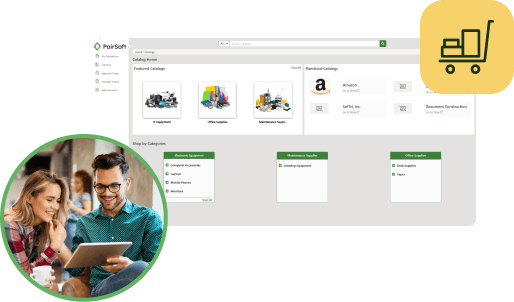When a department (like purchasing) isn’t directly responsible for generating revenue, it’s often less of a priority when the company invests in new automation and efficiency tools.
Increasingly, however, companies are recognizing that the entire procure-to-pay cycle is one of the most natural processes to introduce automation into and one where the potential return-on-investment (ROI) is the greatest.
This is where procurement software comes into play.
Calculating the ROI of any new technology tool can be tricky, but we’ve developed a tool that can help, by answering some fundamental questions and delivering actionable information. How much can you save by automating the procurement process?
What is our manual system costing us?
In a manual procurement process, your staff spends a lot of time on tasks such as obtaining quotes, creating requisitions and routing them for approval, maintaining vendor compliance, matching invoices to purchase orders and receiving documents, managing exceptions, entering invoices, and general management and oversight.
Naturally, the longer it takes to perform each of these tasks, the more each purchase order or invoice costs the company. Traditionally it’s been difficult to estimate these indirect costs.
Before implementing a procure-to-pay solution, it makes sense to analyze the potential ROI, asking (and answering) questions such as: What are you spending now—and on what? Where do the savings opportunities with automation lie? Can you quantify the potential savings? What are the first steps to take toward automation?
What and where can we save?
Together with PayStream Advisors, we’ve launched the Procure-to-Pay Calculator, a simple, yet powerful tool that instantly analyzes what your current procurement processes cost your company, and provides a detailed picture of where and how much you can save by implementing a procure-to-pay solution.
Using PayStream Advisors’ extensive market research on topics surrounding purchasing and payables processing, the calculator provides a quick estimate of your company’s total annual purchase order and invoice related costs and shows how much your company can save by introducing automation to those tasks.
The calculator is a simple way to estimate your ROI so that you can better make a case for automation, and turn your procurement department into a valuable contributor to the bottom line.
How does it work?
The calculator factors in all the variables contributing to a company’s estimated cost per purchase order (CPPO) and cost per invoice (CPI), such as the time procurement and payables professionals spend on all activities across the PO and invoice lifecycles.
After entering some basic information, companies can quickly estimate their current costs—and also see how those costs could change by automating processes.
For example, a mid-market organization processing 1,500 requisitions and 3,000 invoices per month may have three purchasing agents, two payables clerks, and a manager in each department.
Using the Procure-to-Pay calculator, organization leaders can clearly see their current estimated cost per purchase order (CPPO) and cost per invoice (CPI), and they can also view the potential savings they can achieve with automation—up to 52 percent per year.
What are the next steps?
Armed with an idea of what procure-to-pay software can save your company, the calculator tool produces a Next Steps document to help demonstrate the tactical and strategic benefits of procure-to-pay automation to decision makers, along with an implementation plan for putting a new, automated procure-to-pay process in place.
And to further help you bring your case for automation, we’ve created an informative infographic that sheds light on the inefficiencies of a manual system and highlights the benefits of automation.
Benefits beyond the savings
If the cost savings outlined by the calculator aren’t enough to make your case, know that smart, progressive procurement strategies can not only save your company money, but they may even boost innovation and enhance the quality of products and business outcomes with benefits including:
- Improved visibility into spending
Gain company-wide insight into current and planned expenditures from a single source.
- Increased productivity
Employees can spend more time on strategic tasks, and less on manual data entry and paper-chasing.
- Reduced paperwork
Electronic procurement digitizes the purchasing processing, reducing or even eliminating the need for paper documents.
- Faster transaction speeds
Automated workflows, alerts, and reminders keep processes moving and identify bottlenecks.
- Bolstered buying power
By centralizing corporate purchasing, you can benefit from quantity discounts and better payment terms.
- Increased accuracy
By eliminating manual touchpoints, you eliminate the opportunity for errors. Plus, rules within the application prevent most routine mistakes.
As a company running Acumatica, NetSuite, or Sage, we invite you to take the Procure-to-Pay Calculator for a test drive and explore your potential path to savings with an integrated procurement management solution.







